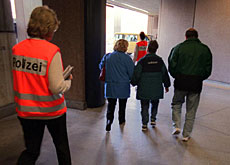Coalition rejects “inhumane” asylum law

A coalition of non-governmental organisations has stepped up its campaign against a proposed tightening of Swiss asylum law ahead of a nationwide vote.
The “Coalition for a Humanitarian Switzerland”, representing 36 non-governmental organisations, claims that it could realistically win the September referendum despite limited financial means.
The alliance is highly critical of the new law, which is says “generates lots of hot air, is inhumane, attacks the wrong target, exacerbates the criminalisation of asylum seekers and overburdens the cantons”.
The proposals include cutting social welfare payments to excluded asylum seekers, rejecting people arriving without proper identity papers from asylum procedures and raising the maximum detention of foreigners awaiting deportation to 18 months.
Representatives of the country’s Catholic and Protestant churches, who have joined the coalition, said the revised legislation is a breach of Christian values such as human dignity.
“The law is wide of the mark,” said Thomas Wallimann-Sasaki of the Catholic Swiss Bishops’ conference, adding that the proposed measures were disproportionate.
A recent public poll found that 43 per cent of the electorate are in favour of tightening asylum law. But Jürg Schertenleib, the Swiss Refugee Council’s legal expert, is not particularly concerned by these results.
“Comparisons with a similar poll carried out five weeks before the rejection of a 2002 asylum initiative show that we are well placed. We can realistically win this vote, but we have to get our act together,” he stated.
Campaign
The coalition plans to raise SFr600,000 ($483,000) to fund a poster and advertising campaign, calling on a number of Swiss personalities to help persuade wavering voters.
Although funds are limited, Schertenleib pointed out that the coalition is part of a broader movement that opposes the new asylum law.
“We are just one of four committees fighting the tougher asylum law,” he told swissinfo.
“We can count on the committee of centre-right politicians. It is important that people see that centre-right voters are also against the law, not just left-wing parties.”
The rightwing Swiss People’s Party, which is spearheading the government campaign in favour of tightening both the asylum and immigration laws, says the changes will prevent abuses of the system and conform with Switzerland’s humanitarian tradition.
Justice Minister Christoph Blocher said in June that the changes to the law would make Switzerland less attractive for illegal immigrants, human traffickers and criminals.
Cantonal authorities generally support the government’s stance.
According to a recent public poll, commissioned by Sunday newspapers, 43 per cent of the electorate are in favour of tightening Switzerland’s asylum law.
Thirty per cent of voters are opposed to tightening the existing legislation on asylum and 27 per cent are still undecided. Citizens will have the last say on the proposed amendments on September 24.
swissinfo with agencies
Under the revised asylum law, rejected asylum seekers would no longer receive social welfare payments and the maximum detention period for foreigners awaiting deportation would be raised to 18 months.
The granting of admission on humanitarian grounds has been ruled out. But it has been made easier for those granted asylum to be joined by their families and to work.
Also to be voted on in September will be a revision to Switzerland’s immigration law, called the Foreigners National Act, which favours EU and Efta nationals and limits the migration of non-European and unqualified workers.
The migration of family members also becomes harder.
Both laws were approved by parliament last December, but face a nationwide vote on September 24.
Asylum seeker requests:
1970s: 1,000-3,000 per year.
1991: 41,000 (mainly due to crises in the Middle East, Sri Lanka and in the former Yugoslavia)
2000: 18,500
2005: 10,061 (-30% from 2004, and the lowest number since 1986)
Main asylum seeker countries in 2005: Serbia and Montenegro, Turkey and Somalia.
Just under 95,000 foreigners (including 993 recognised refugees) migrated to Switzerland last year, slightly less than in 2004.
Foreigners constitute more than 20% of the Swiss population (over seven million people)

In compliance with the JTI standards
More: SWI swissinfo.ch certified by the Journalism Trust Initiative











You can find an overview of ongoing debates with our journalists here . Please join us!
If you want to start a conversation about a topic raised in this article or want to report factual errors, email us at english@swissinfo.ch.